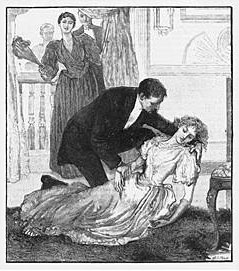Couches have
been used over time in many different styles and for many different purposes. The
reclining couch in this picture is often associated though movies and TV shows with
psychological therapy. But this couch is actually called a fainting couch. The
term fainting couch comes from the th century,
where the couch would be used for women to faint on (and hopefully recover!). While
fainting couches became popular in the Victorian era, they weren’t created
during this time period. Reclining couches have existed ever since ancient
Greek and Roman times. Reclining furniture can be found in many old Greek and
Roman pictures and may have been in ancient Greece since the 7th
century BC. The Victorians were very fond of reviving historical styles thus
adapting Greek and Roman furniture to their own households. What the Victorians
did do was give the reclining couch a new name and purpose, yet they didn’t
invent it.
Victorian era of the 19 In the
Victorian era there are many stories of woman fainting or swooning. This has
led to the depiction of the “swooning Southern Belle” in period movies and
books like Jane Eyre. The question is why did the women faint so much? The most
agreed upon reason is that their corsets were too tight and this led to
shortness of breath and feelings of wooziness or dizzy spells. Worn around the
torso, corsets were often made of a durable tightly woven fabric in which
vertical ribs or boning was inserted. This is called boning because they were
often made of whalebone. Corsets were sometimes meant to give a skinny, flat
look, while other times they were meant to add extra curves or voluptuousness.
Either way these high statements of fashion common during the Victorian era
would have tight lacing that often squeezed organs together and displaced ribs.
Movement around the house, especially up and down stairs, would cause many
Victorian women to have to lie down for a second. This is why many of these fainting
couches were near the staircases in homes.
In the
Victorian era there are many stories of woman fainting or swooning. This has
led to the depiction of the “swooning Southern Belle” in period movies and
books like Jane Eyre. The question is why did the women faint so much? The most
agreed upon reason is that their corsets were too tight and this led to
shortness of breath and feelings of wooziness or dizzy spells. Worn around the
torso, corsets were often made of a durable tightly woven fabric in which
vertical ribs or boning was inserted. This is called boning because they were
often made of whalebone. Corsets were sometimes meant to give a skinny, flat
look, while other times they were meant to add extra curves or voluptuousness.
Either way these high statements of fashion common during the Victorian era
would have tight lacing that often squeezed organs together and displaced ribs.
Movement around the house, especially up and down stairs, would cause many
Victorian women to have to lie down for a second. This is why many of these fainting
couches were near the staircases in homes.
The fainting
couch in the Farm House Museum is located in the library. The reason behind
this location goes back to a 1907 picture of the Farm House library taken for
an agriculture magazine. This picture is the oldest known picture taken of the
inside of the Farm House and it shows a skirted fainting couch prominently
situated in the library. Thus the fainting couch placed in the library
currently is meant to reflect that historic picture. The fainting couch can teach
us a lot about Victorian culture associated with fainting. While fainting from
a fashionable tight corset was the most agreed upon reason for the couches
unique name, there were other reasons as well. One reason for fainting could have
come from dehydration especially in the hot summer months where a Victorian
woman would often wear layers including a corset, a bustle pad, a full skirt, a
petticoat (sometimes lined with steel hoops) and a bonnet. All these extra
layers could get very hot, very fast, along with the added stress to the body
of holding up the weight of the cloths themselves. All this heat and extra weight
could make any woman dehydrated, causing them to faint from overheating or heat
stroke.
One more
possibility for the reason Victorian women frequently fainted was that they
were actually just pretending to faint. It was considered very ladylike to swoon
when women felt any sense of shock. This was meant to show their delicate
nature and was a strong social cue for women whenever they saw something that
might be scandalous or unladylike. Due to these social norms, women might have
used fainting and thus fainting couches to get out of uncomfortable situations.
If they wanted to avoid someone or something, they could faint. If they needed
to use the toilet but didn’t want to announce it, they could faint. Fainting
was one of the few ways Victorian women could change a subject or abruptly exit
a room while still being considered ladylike. These social norms surrounding
fainting couches can continue to tell us how women might have acted in the Farm
House during the Victorian era since we know from the 1907 photo a fainting
couch was present in the library at the time. There are a lot of different
objects within the Farm House that continue to tell us more about the past,
gender roles, society, fashion, and many other interesting historical topics.


